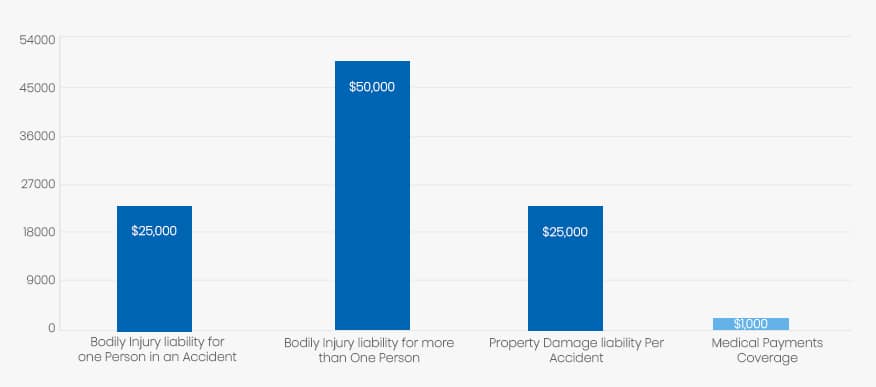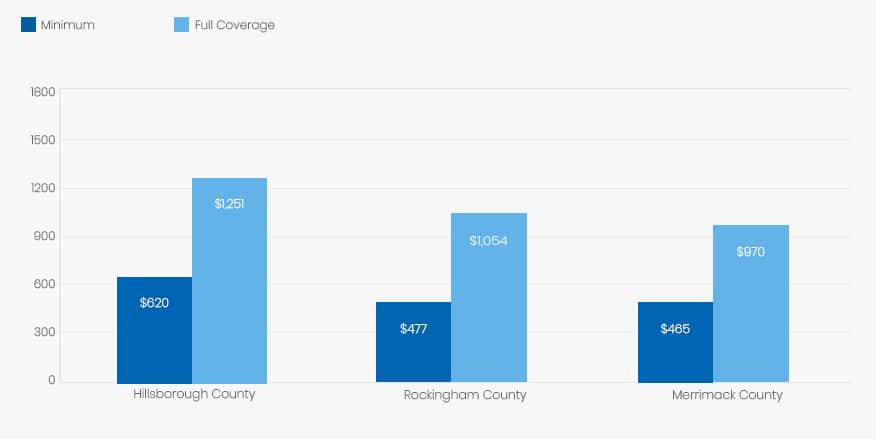New Hampshire Car Insurance
- Requirements for New Hampshire Drivers
- Minimum Auto Insurance Requirements in New Hampshire
- Are Any Auto Insurance Laws Specific to the state of New Hampshire?
- Ways to Lower Your Auto Insurance in New Hampshire
- Are Requirements for Part-Time or Full-Time New Hampshire Residents
- New Hampshire Rates Compared to National Average
Known as the Granite State, New Hampshire is a northeastern state known for the shrimp it produces along the short Atlantic coastline as well as being the first state in the 20th century to participate in the lottery. The state’s well-maintained highways and many tourist attractions contribute to a lot of traffic throughout this state. Where there is traffic, there must be auto insurance. Get some important information on New Hampshire car insurance laws and learn how you can get the best rates.
Summary of Auto Insurance in New Hampshire
New Hampshire car insurance is available through many insurance companies. While it may not be legally required, most responsible drivers choose to purchase car insurance. Having full coverage insurance ensures that your car will be replaced or repaired if it’s involved in a accident, and the insurance company is the one paying for the damage.
Car insurance also ensures that you’re covered in the case of an accident where you’re at fault and are being sued. Below are the different types of auto insurance available in New Hampshire.
Liability coverage
This is generally offered as auto liability, bodily injury liability, and property damage liability. It pays for damages to others from an accident where you were legally liable. The bodily injury part takes care of medical bills, funeral expenses, legal costs, etc. The property damage part takes care of damage done by you to another person’s property. Liability insurance does not pay for damages to your vehicle.Medical payments coverage
This helps pays medical bills for you and your family if you’re in a car accident.Collision coverage
This pays for damages to your car when it collides with another. Comprehensive coverage – This pays for damages to your car from accidents that are not collision. Examples would be vandalism, theft, storm damage, animal damage and windshield replacement.Uninsured or Underinsured Motorist Bodily Injury Coverage
This pays for injuries suffered by you and your passengers if you’re involved in a car accident, and the other driver either didn’t have any insurance or didn’t have enough to cover the expenses.Towing and Labor
This will help pay the bill to have your vehicle towed to a shop after an accident or if it breaks down on the road.Rental reimbursement
This helps you pay for a rental car while your car is being repaired from an accident.
Comprehensive and collision coverage generally come with a deductible, which is the amount you must pay before the insurance company pays their portion. Deductibles can range from $250 to $1,000 or more. The higher your deductible, the lower your premiums are going to be.
Requirements for New Hampshire Drivers
Although drivers are not required to carry auto insurance in New Hampshire, they are required to show that they have sufficient funds to satisfy the New Hampshire Motor Vehicle Responsibility Requirements if they are in an at-fault accident. Failure to meet these requirements may result in a license suspension. If they do choose purchase car insurance, they must purchase the following types of insurance.
It also requires that proof of insurance be with the driver in the vehicle at all times and that all drivers in the household be covered under the liability insurance. As an alternative to carrying liability insurance, the driver can instead provide a cash bond of at least $50,000 or have a vehicle liability bond on file with the Alabama Department of Motor Vehicles.
Drives are required to show proof of insurance if they are stopped by law enforcement, involved in an accident or at the time of registration. Drivers caught driving without auto insurance can face the following penalties:
- Bodily injury liability
- Property damage liability
- Medical payments coverage
- Uninsured motorist
- Underinsured motorist
There are some circumstances where drivers are required to carry insurance.
- Drivers who have been convicted of DWIs
- Drivers who have obtained enough demerit points due to poor driving habits
- Drivers who are habitual traffic offenders
Drivers who fall in this category are required to file a SR-22 form, which indicates that the driver has liability insurance.
Minimum Auto Insurance Requirements in New Hampshire

| Coverage | Minimum |
| Bodily injury liability for one person in an accident | $25,000 |
| Bodily injury liability for more than one person | $50,000 |
| Property damage liability per accident | $25,000 |
| Medical payments coverage | $1,000 |
Uninsured/underinsured motorist coverage amounts must match your liability amounts.
Are Any Auto Insurance Laws Specific to the state of New Hampshire?
One of the most important auto insurance laws in New Hampshire is that drivers here are not required to carry automobile insurance.
New Hampshire uses the “comparative negligence law” when there is a car accident involving more than one party. The settlement is based on the percentage by which you were at fault. You can only receive compensation from the other driver’s insurance company if you were 50 percent or less at fault for the accident.
Another interesting tidbit about New Hampshire is that despite in being one of the rare states to not require insurance, it’s also one of the states with the lowest number of uninsured drivers.
Insurance companies have the right to turn down drivers wanting car insurance if the drivers has a bad driving record and poses a financial risk to the company. To ensure that every driver who wants insurance can purchase car insurance, many New Hampshire insurance companies got together and formed the New Hampshire Automobile Insurance Plan. Rather than one insurance taking all the risk of carrying an at-risk driver, all the participating companies can share the risk. The insurance premiums through the NHAIP are more expensive, but the driver is guaranteed car insurance.
Ways to Lower Your Auto Insurance in New Hampshire
If you’re looking for ways to lower your auto insurance, it’s important to know what determines what your rates are going to be. These factors all pay a role
- Age and gender
- Marital status
- Coverage amounts
- Household members who drive
- Where you live
- Type of vehicle (year, make and model)
- Use of auto (personal or business)
- Miles you drive daily
- Credit history
There are various ways you can lower your auto insurance premiums. The best way is to practice safe driving habits. There are also various discounts you may be eligible for through your insurance company.
- Good student
- Good driver
- Anti-theft and safety devices
- Auto/home packages
- Low mileage discount
- Multiple-car discount
- Claim-free discount
These are just some of the discounts you may find. Each company offers different types. Don’t be afraid to ask your agent about discounts and use them as a way to negotiate better terms from insurance agents. If they’re interested in your business, they’ll be willing to get you the very best price particularly if you’re a good driver.
You may also consider increasing your deductibles. You would be surprised at the difference in premiums on a $1,000 deductible policy vs. a $250 deductible policy.
Are Requirements Different for Part-Time or Full-Time New Hampshire Residents?
There are no specific insurance requirements for part-time residents of New Hampshire other than the amounts of insurance they must have if they decide to purchase insurance. Part-time residents moving into New Hampshire have 60 days to register their vehicles. At this point, they will be under New Hampshire insurance laws.
Prior to the new registration, the individual will go by the insurance laws from the state in which he or she lived. Individuals who are temporarily living in New Hampshire can apply for a temporary driver’s license by providing proof of identification and a valid driver’s license from their state of residence. These individuals must also abide by the laws of the state in which their driver’s license was issued.
New Hampshire Rates Compared to National Average
When it comes to car insurance, it definitely pays to live in the Granit State because drivers typically pay insurance rates that are quite a bit lower than the national average. The average annual car insurance rates in New Hampshire are about $983, which is almost $500 less than the national average.
Average Rates in Top Three New Hampshire Counties
Although there are only ten counties in New Hampshire, it’s not unusual to find different insurance rates from one county to the next or even one city to the next.
To demonstrate this, I’ve used a 45-year old married woman with a good driving record to find rates in three top New Hampshire counties. Below are my findings.

| City | Minimum Coverage | Full Coverage |
| Hillsborough County | $620 | $1,251 for full coverage |
| Rockingham County | $477 | $1,054 for full coverage |
| Merrimack County | $465 | $970 for full coverage |
Conclusion
Auto insurance falls into the category of things that we never fully appreciate until it’s actually needed. Even if it wasn’t a legal requirement, it’s still a wise choice to make if you own a vehicle or drive on public roads in New Hampshire. When you factor in the financial benefits of having auto insurance, you’ll realize it’s actually quite affordable and more than worth the cost. With a few wise decisions and some comparison shopping, you can get the best possible rates for your New Hampshire insurance
Sources:
- https://www.nh.gov/insurance/consumers/documents/nh_auto_guide.pdf
- https://www.dmv.org/nh-new-hampshire/car-insurance.php
- https://www.nh.gov/safety/divisions/dmv/financial-responsibility/insurance.html